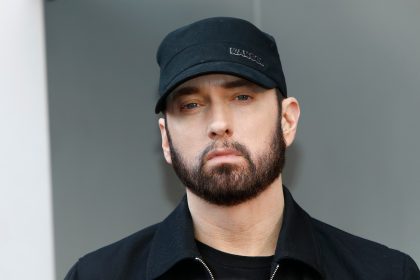
story and images by Todd Williams
for Steed Media Service
He’s been caught in the middle of a seemingly endless
whirlwind media blitz for over seven years. Curtis “50
Cent” Jackson arrived like a bolt of lightning on the hip-hop
landscape back in the fall of 2002. 50 was an underground
sensation who had been paired with the both the hottest
producer in the game, Dr. Dre, and at the time the hottest
rapper on the planet, Eminem. So, when his debut album
arrived a few months later, the former drug dealer from the
South Jamaica section of Queens, N.Y., was undeniably the
most talked about man in music.
What followed over the course of the next few years was
a mix of hits made for the fans, shots taken at adversaries,
and money being made hand over fist by 50 — a man who
understood the power of his brand, perhaps better than any
other rapper before or since.
The market was flooded with 50. He released three
multiplatinum albums between 2003 and 2007, a film
loosely based on his life (Get Rich or Die Tryin’), a video
game (Bulletproof), and he became a major shareholder
in the Vitamin Water brand, which he sold to Coca-Cola for
millions.
But amid the business deals and glitzy marketing
campaigns, the very element that had been at the heart of
50’s appeal — his gritty edge — seemed to be diminished.
The dark and well-documented details of Curtis Jackson’s
back story — his mother’s murder, an adolescence steeped
in criminality, the attempt on his life, and the shooting of his
superstar mentor — is the stuff Martin Scorsese films are
made of. But as his profile rose, and the hits kept coming, it
became harder to cling to that bullet-riddled image, no matter
how authentic it may have been.

“Artistically, I’ve identified what parameters the public set
on me,” 50 says thoughtfully. “What translated the strongest
in my first effort, Get Rich or Die Tryin,’ was the aggression.”
After that first blockbuster album, 50’s public persona was
set in stone, and his ability to appeal to both the grimiest kid on
the corner and to girls shopping
at Ambercrombie & Fitch made
for a heady mix of street cred and
crossover appeal.
“You don’t get a second
chance at a first impression —
and when your [debut] album
is the [best-selling] debut hiphop
album, you set a bar that is
beyond average.”
50 learned a lot from watching
Eminem’s success, and it gave
him some perspective as to
the fluctuating nature of album
sales.
“[Eminem’s 2000 album] The
Marshall Mathers LP was moving
23 million copies, [and] it kept
me down to earth when I was
selling 12. It made me feel like
there was room for growth. Other
artists blamed it on Em being
white [laughs]. So we can blame
Tiger [Woods] being Tiger on him
being black? It’s just when you
have a gift and you actually work in that direction, and that’s your calling, you’re going
to be better than other people at it. I just look forward to generating the interest of the
public,” 50 says.
But the emergence of 50 Cent coincided with another upstart movement in hip-hop.
A new breed of quirky, witty, pop-culture obsessed rappers were beginning to draw
attention. With the ubiquitous Kanye West leading the creative charge, a wave of altrap
phenoms like Pharrell Williams, Lupe Fiasco and others began to chip away at the
standard hard-core rapper aesthetic. These rappers seemed to shy away from or slyly
poke fun at the gangsta machismo of hip-hop’s previous decade.
50 Cent, however, knows how to make some noise for himself. He’s got a new album
hitting stores, a new film hitting theaters, and a new fragrance hitting department store
shelves. His album, Before I Self Destruct, is a return to the gritty-yet-glossy sound of
his debut, and 50 says he now has a better understanding of what the general public
expects from him as an artist. “They don’t want good music, they want magic from me,”
he says.
And 50 believes he has found that magic by going back to the sound and approach
that he was known for before he was a household name. “This project is the prequel
to Get Rich or Die Tryin’, ” he explains. “I wrote [about] the things and the events that
influenced me that I’ve experienced in my life, prior to being motivated to write Get Rich
or Die Tryin’.”
And the fans are appreciative, so far. “The response to it to this point makes me feel
like I’m already satisfied with the performance and the music,” 50 says.
The launch of his new signature fragrance, Power by 50 Cent, has been met with
buzz around the industry and he’s been making appearances to promote this new
endeavor. One lesson 50 seems to have mastered since he first crashed into the
public consciousness seven years ago is the importance of branding. He feels that his
fearlessness is what sets him apart from many of his peers in hip-hop.
“[It’s] just me being open-minded, [and] not being afraid of going out into territories
that I didn’t actually intend to go into initially, and [me] being prepared to absorb new
information,” explains 50. “A lot of times you go into staff meetings or boardrooms,
and no one wants to be the person who has the wrong answer or the person who is
visibly learning. I don’t mind being that person as long as I leave that setting with what
I needed.”
He’s used that mind-set to expand his business empire, which still includes his label
and imprint G-Unit. The label has provided both some much-needed buzz and a creative
restart for past hip-hop notables from the past, from Ma$e to Mobb Deep.
In keeping with that tradition, 50 has been in talks with former Roc-A-Fella rapper
Beanie Sigel. After a much-publicized fallout with his former Roc-A-Fella compatriot Jay-Z, Beanie may be joining 50 Cent & Co. Ever the shrewd decision maker, 50 isn’t jumping
the gun, but sees great potential in the Broad
Street Bully joining the family.

“It’s conversation,” 50 says with a smirk.
“I think all hungry, talented artists are a good
fit for G-Unit. From an artist’s perspective, I
pride myself on being who I am. I never tell
an artist, you shouldn’t say that. I let them
find themselves. If there’s a point where they
want to collaborate, I offer my vision at that
point. Other than that, I don’t hold them to
one position.”
But 50 Cent admits that there has been an
occasion where he felt some apprehension
about an artist’s approach — and regrets
having been silent about his reservations.
“I recorded a record on Mobb Deep’s
album for G-Unit called “Pearly Gates,” he
recalls. In the song, an angry Prodigy lashes
out at God and religion, feeling that he — and
mankind in general — have been abandoned.
“Prodigy wrote a verse that reflected how
he feels about religion — based on him
having sickle cell,” 50 explains. He pauses
for a moment. “[Prodigy is] going through
a painful life. [That’s the] only time in my
career when I committed to supporting an
artist who maybe did something that made
me feel … unsure.”










